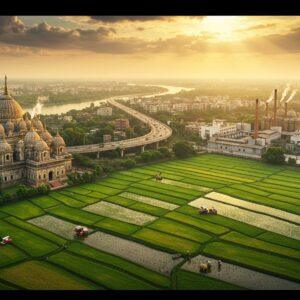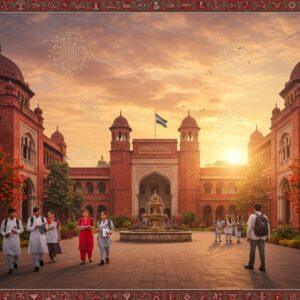
The Telugu diaspora, originating from Andhra Pradesh and Telangana, represents a vibrant global community. Telugu people have spread worldwide, enriching their new homes with their rich cultural heritage. This article explores the presence of Telugu communities in major Indian cities like Bangalore, Chennai, and Pune, highlighting their unique contributions and cultural practices. It also examines the global reach of the Telugu diaspora and its influence on local cultures around the world.
Telugu People in Bangalore
A Thriving Community in Bangalore’s Tech Hub
Bangalore, India’s Silicon Valley, hosts a large Telugu-speaking population, drawn by educational opportunities and the booming tech industry. Numerous Telugu associations and cultural organizations organize events like Ugadi, Sankranti, and Dasara, ensuring Telugu traditions flourish.
- Telugu Language Schools: Weekend Telugu language classes are popular among children, helping them connect with their heritage and maintain fluency.
- Tollywood Fan Base: Bangalore has a dedicated Tollywood fan base, with special screenings and events celebrating Telugu cinema and its stars.
- Telugu Cuisine: Telugu culinary delights, like biryani and pappu, are widely available, satisfying cravings for traditional tastes.
- Literary Clubs: Literary clubs provide platforms for appreciating and celebrating Telugu literature and poetry, fostering a sense of cultural identity.
The contributions of Telugu professionals to Bangalore’s IT and startup ecosystem are significant, driving innovation and growth.
Telugu People in Chennai
Deep-rooted Telugu Presence in Chennai
Chennai, the capital of Tamil Nadu, shares a long and intertwined history with the Telugu community. Its proximity to Andhra Pradesh has led to generations of Telugu settlers, contributing to the city’s diverse cultural fabric.
- Cultural Organizations: Active cultural organizations arrange festivals, social gatherings, and other events, strengthening community bonds and celebrating traditions.
- Carnatic Music: Chennai’s rich Carnatic music scene often features Telugu compositions, reflecting the deep cultural exchange between the two regions.
- Educational Institutions: Dedicated schools and colleges cater specifically to Telugu-speaking students, ensuring access to education in their mother tongue.
- Film Industry Ties: Chennai’s film industry has close ties with Tollywood, with many Telugu actors and technicians residing in the city.
- Telugu Cuisine: Numerous restaurants in Chennai specialize in authentic Telugu cuisine, offering a taste of home for residents and visitors alike.
Telugu literature and drama are promoted through cultural events and theater productions, enriching Chennai’s artistic landscape. The influence of Telugu professionals in Chennai’s healthcare and academic sectors is noteworthy.
Telugu People in Pune
Growing Telugu Community in Pune
Pune’s renowned educational institutions and vibrant culture attract a growing Telugu-speaking population. The city offers a welcoming environment for Telugu individuals seeking academic and professional opportunities.
- Academic Community: Pune’s engineering and management colleges have a large number of Telugu students, contributing to the city’s academic excellence.
- Cultural Events: Cultural associations organize dance performances, music concerts, and other events, showcasing the richness of Telugu arts.
- Language Classes: Telugu language classes are available for children and adults, helping preserve language skills and cultural identity.
- Professional Presence: Telugu professionals have a notable presence in Pune’s IT and automotive industries, contributing to the city’s economic growth.
- Cuisine: Popular Telugu dishes, such as gongura pachadi and avakaya, are readily available, providing a taste of home.
Literary events and Telugu book clubs further promote Telugu literature in Pune. The contributions of Telugu people to Pune’s cultural and social landscape are celebrated through various community initiatives.
Global Telugu Diaspora
The Telugu diaspora extends across continents, with significant communities in North America, Europe, Australia, and the Middle East. These communities thrive while maintaining strong ties to their cultural roots.
As of 2025, the Telugu diaspora has seen continued growth and engagement, with cultural organizations playing a vital role in maintaining connections to their heritage. These organizations often organize events, language classes, and religious celebrations to keep Telugu traditions alive. The Telugu language remains crucial in preserving their cultural identity. The World Telugu Federation and the Andhra Pradesh government have established the Telugu Heritage Museum in Visakhapatnam to showcase Telugu culture and history.
- North America (as of 2025): Strong Telugu communities thrive in cities like New York, San Francisco, and Dallas, with active cultural associations hosting festivals and events.
- Europe (as of 2025): Telugu communities in Europe, particularly in the UK (London and Birmingham), contribute to cultural diversity and participate in multicultural festivals.
- Australia (as of 2025): The Telugu community in Australia continues to grow, with associations promoting cultural exchange and community building.
- Middle East (as of 2025): A significant number of Telugu expatriates reside in the Middle East, and social clubs foster community spirit and mutual support.
Telugu media, including TV channels and online platforms, plays a vital role in maintaining cultural ties within the diaspora. The contributions of Telugu professionals to global industries, such as technology, healthcare, and academia, are widely recognized.
Cultural Preservation and Challenges
While Telugu communities worldwide actively preserve their cultural heritage, they face challenges like language retention and cultural assimilation.
- Language Retention: Efforts to teach Telugu to younger generations are crucial, utilizing schools, online platforms, and community language programs.
- Festivals and Rituals: Community events and celebrations of traditional festivals and rituals provide a platform for cultural expression and reinforcement.
- Role of Media: Telugu films, TV shows, and literature play a vital role in maintaining cultural connections and transmitting values.
Balancing traditional practices with modern lifestyles and integrating into local cultures while maintaining distinct identities present ongoing challenges. Support from local governments and cultural organizations can help communities navigate these challenges successfully.
How Poojn.in Supports Telugu Communities Worldwide
Poojn.in recognizes the importance of preserving cultural heritage and offers a wide range of products to support Telugu traditions and rituals. We provide authentic puja items, including those specifically used in Telugu weddings, festivals, and other ceremonies. Explore our collection and conveniently order through our website or mobile app.
Telugu Wedding Items
Traditional Telugu Festival Supplies
Download the Poojn app for easy access to our complete product range and worldwide shipping options.
Conclusion
The Telugu diaspora stands as a testament to the resilience and vibrancy of Telugu culture. Across major Indian cities and around the world, Telugu communities have made significant contributions to local economies and cultural landscapes. From Bangalore’s tech sector to Chennai’s artistic community and Pune’s academic institutions, Telugu individuals continue to leave their mark.
Globally, the Telugu diaspora thrives in North America, Europe, Australia, and the Middle East, demonstrating the strength and unity of these communities. Despite the challenges of preserving language and traditions in new environments, Telugu people actively celebrate their heritage through festivals, cultural events, and media.
Continued efforts to retain Telugu culture, supported by organizations and governments, ensure that the rich traditions and values of the Telugu community will continue to flourish for generations to come. The global Telugu diaspora exemplifies the power of cultural heritage preservation and celebration, regardless of geographical location.


